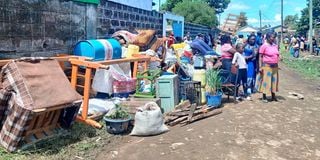Audit exposes state’s lack of readiness to tackle floods

Displaced families in Kaptebwa in Nakuru whose houses were destroyed by floods in May 2024.
What you need to know:
- Report indicates that some victims are still in camps in Baringo, Kisumu and Busia counties.
- The flooding in the country caused by the ongoing rains has already claimed over 220 lives.
Auditor-General Nancy Gathungu has revealed how the government has abandoned some of the victims of 2020 floods, who are still unable to rebuild their lives.
The audit on response to floods in Kenya tabled in the National Assembly recently, shows that despite some of the flood victims still being in the camps, the Directorate of Special Programmes (DSP)- a government agency, had stopped the issuance of relief assistance.
Report notes that although their numbers could not be ascertained, the victims were still in camps in Baringo, Kisumu and Busia counties.
The performance audit, which covered the period of five years- 2017 to June 2022, sampled six counties spread across the flood prone areas in the country.
The audit puts the State Department of Internal Security and National Administration through the National Disaster Operations Centre (NDOC) and the DSP in a tight corner in terms of recovery after floods and coordination of actions.
Report notes that the limited recovery interventions by the government has exposed the affected persons, thereby increasing their vulnerability to future floods.
“Even though most of the victims had gone back to their homes, the majority are not able to rebuild their houses and are living in tents,” the audit states.
The counties sampled in the performance audit are Baringo, Narok, Busia, Garissa, Tana River and Kisumu with the auditors making specific recommendations to the government on how to deal with future occurrences.
Kenya is divided into six catchment areas out of which four are prone to flooding - Lake Victoria North and South basins, Rift Valley and Tana.
The situation may have worsened because of the rains that started in November 2023 and intensified in the months of April and May this year.
The flooding situation in the country caused by the ongoing rains, the worst in the country’s history, has already claimed over 220 lives compared to the 76 lost during the period under review.
In all the two flooding instances, other than deaths, thousands have been injured and property destroyed.
According to the audit, comfortable stay in the evacuation camps would have required that the DSP provides affected persons with items like tarpaulins, blankets, mattresses, mosquito nets, kitchenware and mobile toilets.
However, focus group discussions with sampled community representatives revealed that the government only provided food items to the victims most of the time.
The community representatives reported that mostly it was Kenya Red Cross Society that provided non-food items, which was confirmed through review of documents.
“Out of 20 relief request letters with information on allocation, 12 requests were for both
food and non-food items but only food items were allocated,” the audit says adding; “the affected persons had to look for firewood to prepare their food.”
But even as the victims toil in the camps, the government is spending huge on non-priority areas like renovation of State installations - State House and Deputy President’s official residence in Karen and acquisition of fuel guzzlers for State officers, in selected instances of misuse of public resources.
Nonetheless, the audit attributes the limited recovery efforts after flooding to the lack of clear mandate, institutional capacity challenges and lack of contingency planning.
The audit also established that it was not clear whether it should be the responsibility of the national or county government to facilitate the community in recovery.
Further, the audit notes that the recovery of infrastructure “is a multi-agency affair with NDOC as a coordinator.”
However, it was revealed that NDOC was not legally constituted and therefore lacked the required legal backing in supervising activities of the line ministries of government as it became apparent Kenya lacks a focal lead agency charged with flood response operations.
“The DSP and NDOC are expected to play a focal role in disaster response, but they lack the requisite institutional capacity to discharge the responsibility.”
NDOC is expected to be the lead coordinator but it is not legally constituted and lacks the legal backing to supervise players in the system.
The DSP on the other hand has five technical staff yet it is expected to undertake relief and rehabilitation activities for all disasters in the country.
In the unfolding scenario, the victims are always left on their own “to struggle in recovery with no additional assistance from the government thereby increasing their vulnerability.”
The audit reveals that the government’s ability to adequately respond to flood related humanitarian emergencies is hampered by challenges in preparedness, for instance, in the area of disaster risk governance.
The country also lacks a legal framework to govern flood response operations owing to the fact that the development of a national-level disaster policy has been delayed for about 20 years.





